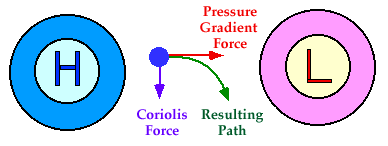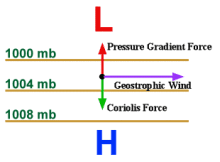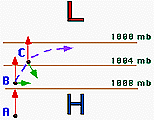An air parcel initially at rest will move from high pressure to low pressure because of the pressure gradient force (PGF). However, as that air parcel begins to move, it is deflected by the Coriolis force to the right in the northern hemisphere (to the left on the southern hemisphere). As the wind gains speed, the deflection increases until the Coriolis force equals the pressure gradient force. At this point, the wind will be blowing parallel to the isobars. When this happens, the wind is referred to as geostrophic.

| The movie below illustrates the process mentioned above, while the diagram at right shows the two forces balancing to produce the geostrophic wind. Winds in nature are rarely exactly geostrophic, but to a good approximation, the winds in the upper troposphere can be close. This is because winds are only considered truly geostrophic when the isobars are straight and there are no other forces acting on it -- and these conditions just aren't found too often in nature. |

|

MPEG (0.9M) |
Moving Air Parcel:
This animation depicts how the pressure gradient and Coriolis forces influence the movement of air parcels. |

coriolis force |
|

gradient wind |